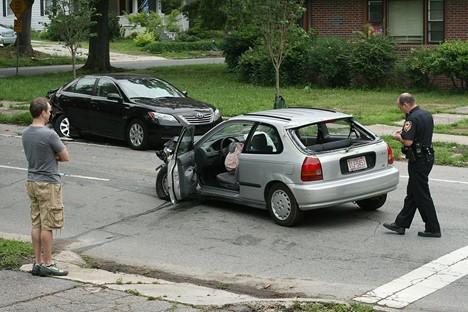Do I Need a Police Report After a Car Accident?

If you're involved in a car accident, you'll have to get a police report in most cases. Some states require you to file a police report if the damages from the car wreck are $500 or greater, or the accident resulted in physical injury or death.
The Purpose of Police Reports
It is important to file a report after a serious accident. Ideally, you should contact the police immediately after the wreck. The police will rush to the scene of the accident and write an account of what took place. This is the report you submit to your insurance company to support your claims.
However, it's not always possible to obtain a police report. And in some cases, the report doesn't contain all the information necessary for filing your insurance claim. If the other driver leaves the scene of the accident, you won't have the driver's insurance details or identification. Or, if someone hits your car while your vehicle is parked outside of your home, it may be difficult to get all the information you need for a detailed police report.
Sometimes insurance companies require you to submit a police report if you're filing an insurance claim. Insurance claims adjusters need the information in the report to validate all the written descriptions of your accident, including determining the parties at fault.
If the accident wasn't your fault, your insurance company will likely contact the insurance company of the other driver to negotiate a settlement. If the wreck was partially your fault, you may be able to pay for part of the damages based on the type of insurance policy you have.
If you're unable to get a police report, you need a lawyer with experience in handling car accident cases.
What Does an Attorney Need to File Your Claim?
It's usually best to report a car wreck to the police. However, you don't have to obtain a police report to file a claim with your insurance companies. In most cases, your insurance provider won't require a report depending on the type of damages you're claiming. However, you have to demand special damages if you're filing a claim, and it's best to get a report if you can to make the process easier.
For instance, suppose you're towing your boat at the time of the accident. You're adhering to traffic laws and aren't at fault for the accident. An intoxicated driver crashes into your vehicle, which causes you to have a wreck. Your boat is disconnected from your car and smashed into pieces. Naturally, you'll want the insurance company to compensate you for the damage to your boat. You won't be able to prove who was at fault for the accident if you don't have a police report.
A Police Report Is Usually Required
Filing a police report isn't just a way to protect you when you're looking to file an insurance claim. Remember, under some state laws, you have to have a police report if you're in an accident, and your property damage is more than $500, or you or a passenger were hurt. You certainly need a police report if the car wreck resulted in the death of a loved one who was in the vehicle.
After an accident, you'll likely be upset, scared, and possibly injured. If the other driver suggests that you simply exchange contact and insurance details at the accident scene, don't do this. All drivers involved in the accident should remain at the accident site until the police arrive. If one of the drivers leave, be sure to tell the police and give the officer as detailed of a description of the vehicle as you can.
As soon as possible, contact a car accident lawyer who can help you with your case. The attorney can work with the insurance companies on your behalf to ensure you get a fair settlement.
More to Read:
Previous Posts:





